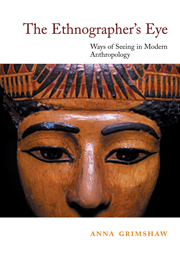Preface
Published online by Cambridge University Press: 05 June 2012
Summary
The Ethnographer's Eye explores the role of vision within twentieth-century anthropology. The book engages with contemporary debates concerning ocularcentrism; that is, it raises questions about the relationship between vision and knowledge in western discourse. My approach is built around the notion of ways of seeing. By this I mean the ways that we use vision to refer to how we see and know the world as anthropologists. I will suggest that the modern discipline contains contrasting ways of seeing. Their investigation throws into sharp relief assumptions about the status of anthropological knowledge, technique and form at the heart of contemporary work.
The book grows out of my experiences as a teacher and ethnographer. Its origins lie in the unusual position I occupy as a ‘visual’ anthropologist at the margins of a discipline dominated by words. Following my appointment to the Granada Centre for Visual Anthropology at the University of Manchester in 1991, I began to explore the contours of the field in which I was now located. Specifically, I wanted to find a way of anchoring my teaching in a coherent anthropological perspective as a counterweight to what Faye Ginsburg calls the ‘unruliness’ of visual anthropology. The subdiscipline seemed to exist only in the form of occasional conferences, as ad hoc collections of papers and, perhaps most frustratingly, as a body of films which seemed almost impossible to obtain.
- Type
- Chapter
- Information
- The Ethnographer's EyeWays of Seeing in Anthropology, pp. ix - xiPublisher: Cambridge University PressPrint publication year: 2001

